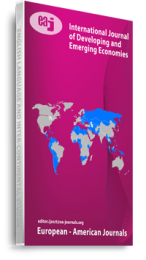Over the years, the Nigerian financial sector has been characterized by relative fragility and instability with intermittent incidences of liquidity challenges, bank distress, bail out, declining all share index and eroding investors’ confidence. Although several efforts have been made by policy makers and financial sector regulators towards stabilizing and strengthening the financial sector, available evidence suggest that the real sector is yet to reflect the gains of financial sector development. Consequently, researchers have made substantial effort to understand the implication of financial sector development for economic growth and economic welfare. It is against this backdrop that this study investigated the impact of financial sector development on economic and economic welfare. The study used time series data spanning between 1970 and 2015. Four major variables were used to proxy financial sector development namely; bank private sector credit, number of banks branch network, liquidity ratio and lending-deposits ratio. Economic growth was measured by growth of real GDP; discomfort index which measures macroeconomic welfare of citizenry as defined by Okun (1962) was computed by summation of inflation and unemployment rate. Vector autoregressive (VAR) model was used for estimations. The findings indicate that not all the financial sector development indicators under study have significant effect on macroeconomic performance in Nigeria. The results show that financial sector development indicators have positive impact on real GDP growth in Nigeria. However, contrary to expectations, private sector credit and lending – deposit spread had negative effects on economic growth. Similarly, apart from access to financial service, all other financial sector development indicators under study exerted negative effects on discomfort index, which implied that financial sector development was capable of improving economic welfare. The study therefore concluded that financial sector development that guarantees increased liquidity and stability of the financial sector is crucial for sustainable economic growth and increased welfare. The study also recommends that the Central Bank of Nigeria and other financial sector regulators should strive to strengthen the financial sector and ensure increased private sector access to financial services such as bank credit through policy formulation and implementation as a means of improving macroeconomic performance of the nation.
Keywords: VAR, discomfort index, economic growth, financial sector development

